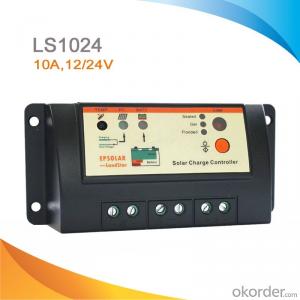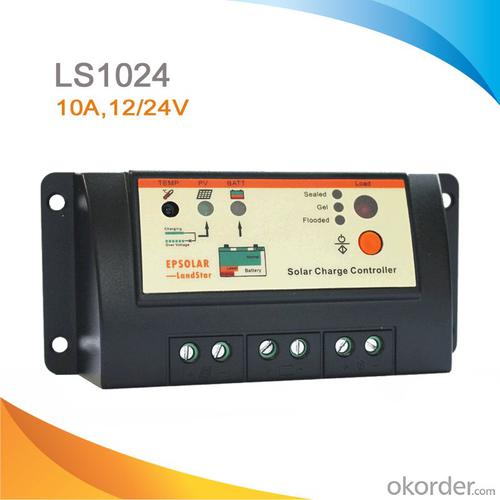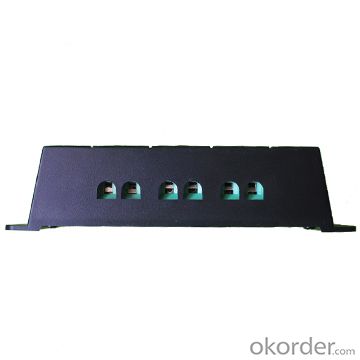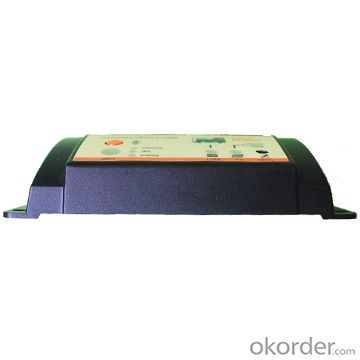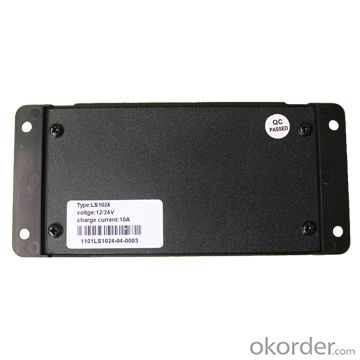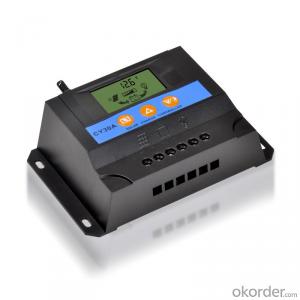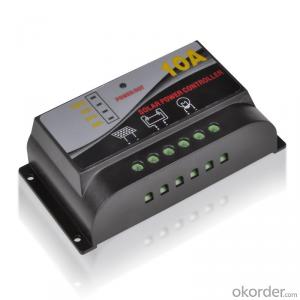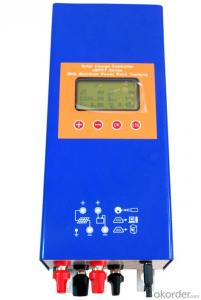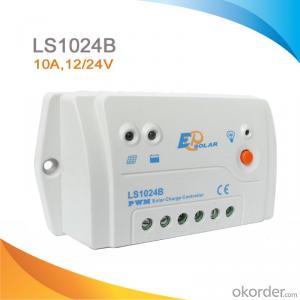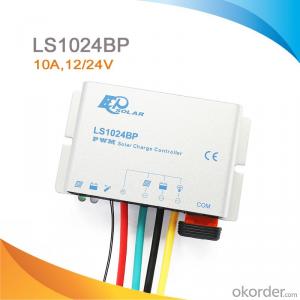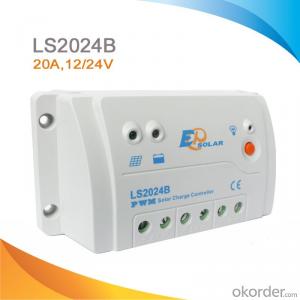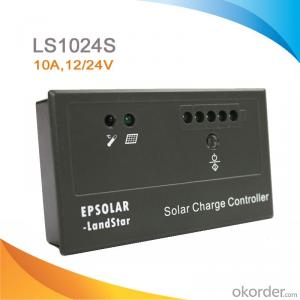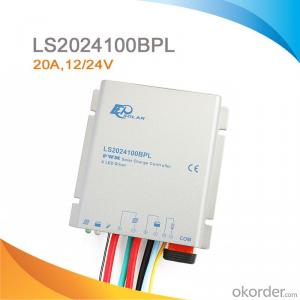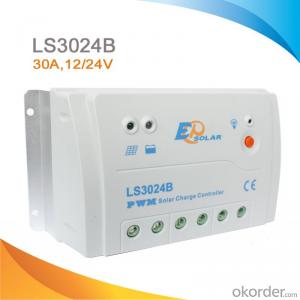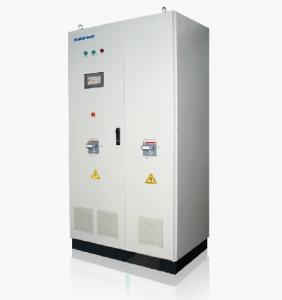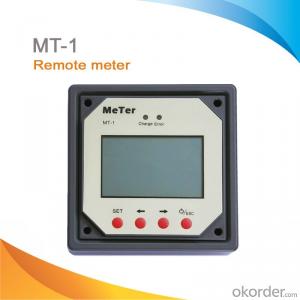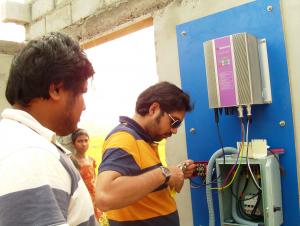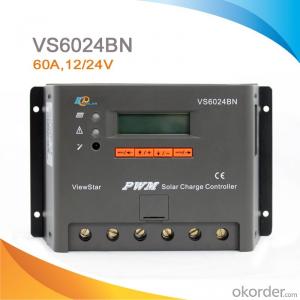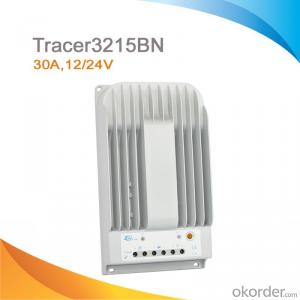PWM Solar Charge Controller with Power Switch for Solar Home System,10A ,12/24V LS1024
OKorder Service Pledge
OKorder Financial Service
You Might Also Like
Solar Charge Controller Descriptions:
LandStar series solar charge controller is a new generation lighting controller for off-grid solar system, such as home system, traffic system, CCTV system. It adopts the most advanced digital technique and operates fully automatically.
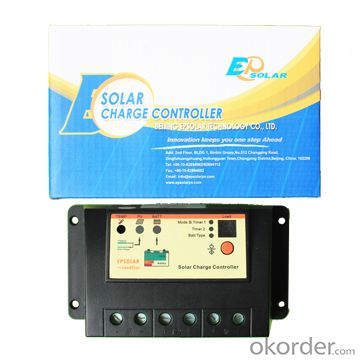
Features:
12V/24V automatic identify or user-defined working voltage.
With functions of current power calculation, it is convenient to view charging and discharging energy of each day, month, year and total value.
Wide input voltage range: DC8.0V---DC32V, compatible with 12V/24/ full voltage range.
Digital precision constant current control and the control accuracy are better than 2%
Maximum output efficiency of 95%
The rated output current can be adjusted at rated power and current range.
The max current output voltage can reach up to 60V
Charge control parameter, the load control parameter and the output current value can be set separately
Use standard Modbus communication protocol for TTL232 bus connection, communication protocol compatibility much better.
Fully encapsulated PCB, IP67 protection
Aluminum housing
Electronic Protections:
·Overheating
·Over discharging
·Over charging
·Load overload
·Load short circuit
·PV short circuit
·PV reverse polarity
·Battery reverse polarity
Specification:
Electrical parameters | LS1024 | LS2024 |
Nominal System Voltage | 12 / 24VDC auto work | |
Rated Battery Current | 10A | 20A |
Max. Battery Voltage | 32V | |
Charge Circuit Voltage Drop | ≤0.26V | |
Discharge Circuit Voltage Drop | ≤0.15V | |
Self-consumption | ≤6mA | |
Overall dimension | 140 x 65 x 34mm | 144 x 75x 45mm |
Terminal | 4mm2 | 10mm2 |
Net weight | 0.15kg | 0.25kg |
Working temperature | -35℃ to +55℃ | |
Humidity | 10%-90% NC | |
Enclosure | IP30 | |
Battery Voltage Parameters (temperature at 25℃) | |||
Battery charging setting | Gel | Sealed | Flooded |
Equalize Charging Voltage | —— | 14.6V;x2/24V | 14.8V;x2/24V |
Boost Charging Voltage | 14.2V;x2/24V | 14.4V;x2/24V | 14.6V;x2/24V |
Float Charging Voltage | 13.8V;x2/24V | 13.8V;x2/24V | 13.8V;x2/24V |
Low Voltage Reconnect Voltage | 12.6V;x2/24V | 12.6V;x2/24V | 12.6V;x2/24V |
Low Voltage Disconnect Voltage | 11.1V;x2/24V | 11.1V;x2/24V | 11.1V;x2/24V |
Equalize Duration | —— | 2 hours | 2 hours |
Boost Duration | 2 hours | 2 hours | 2 hours |
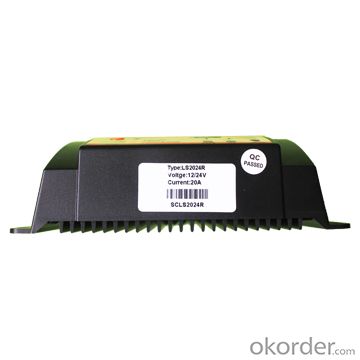
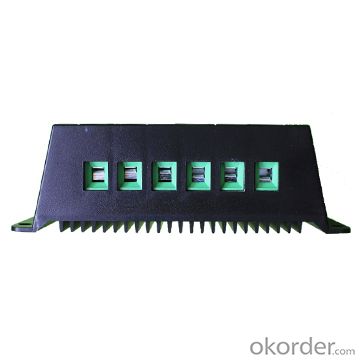
- Q: Can a solar controller be used with solar panels that are connected to a solar telecommunications system?
- When solar panels are connected to a solar telecommunications system, it is possible to use a solar controller. A solar controller, also called a charge controller, is a crucial component in any solar power system. Its primary role is to regulate the flow of electricity from the solar panels to the battery bank, ensuring efficient and safe charging of the batteries. In a solar telecommunications system, where solar panels power communication devices, the importance of a solar controller is amplified. It safeguards the batteries against overcharging, which can harm them and reduce their lifespan. Moreover, a solar controller can prevent reverse current flow from the batteries to the solar panels when sunlight is scarce or absent, thereby safeguarding the panels from damage. By utilizing a solar controller, the solar panels in a telecommunications system can operate at their maximum efficiency, while the batteries are charged and maintained properly. This not only guarantees a reliable power supply for the telecommunication equipment but also extends the overall lifespan of the system. Hence, it is highly advisable to incorporate a solar controller in conjunction with solar panels that are connected to a solar telecommunications system to optimize the system's performance and longevity.
- Q: Can a solar controller be used with different types of solar power systems?
- Yes, a solar controller can be used with different types of solar power systems. A solar controller, also known as a charge controller, regulates the power flow between the solar panels and the battery or grid. It ensures that the battery is charged efficiently and prevents overcharging or discharging. Solar power systems can be categorized into off-grid and grid-tied systems. Off-grid systems are typically used in remote areas where there is no access to the utility grid, while grid-tied systems are connected to the utility grid. Solar controllers are compatible with both off-grid and grid-tied systems. In off-grid systems, the solar controller manages the charging and discharging of the battery, ensuring optimal performance and extending battery life. It also protects the battery from overcharging and over-discharging, which can cause damage. In grid-tied systems, the solar controller plays a different role. It monitors the power output of the solar panels and ensures that it is synchronized with the utility grid. It also manages any excess power generated by the solar panels, diverting it to the grid or to other loads. This helps to maximize the efficiency of the solar power system and potentially earn credits through net metering programs. Overall, a solar controller is a crucial component in any solar power system, regardless of the type. It helps to regulate the flow of power, protect the battery, and optimize the performance of the system. Therefore, it can be used with different types of solar power systems to enhance their efficiency and reliability.
- Q: Can a solar controller handle power fluctuations from the grid?
- No, a solar controller cannot handle power fluctuations from the grid. Its primary function is to regulate and control the power flow from the solar panels to the battery or load. It is not designed to stabilize or manage fluctuations in the grid power supply.
- Q: What is the maximum battery voltage that a solar controller can handle?
- The solar controller's capacity to handle battery voltage relies on its specific model and design specifications. Nevertheless, typical solar controllers can accommodate battery voltages ranging from 12V to 48V. To determine the maximum battery voltage that a particular solar controller can handle, it is imperative to refer to the manufacturer's guidelines or technical specifications. Going beyond this maximum voltage threshold has the potential to harm the controller and undermine its performance and functionality.
- Q: Choose a solar controller which need to have a few conditions
- The controller should have battery overvoltage protection, battery undervoltage protection, load short circuit protection, temperature compensation and other functions, select the controller to choose the quality of the guarantee. Big manufacturers big brand
- Q: Can a solar controller be used with a solar-powered CCTV system?
- Yes, a solar controller can be used with a solar-powered CCTV system. A solar controller helps to regulate and optimize the charging of the solar panels, ensuring maximum efficiency and safety. It also helps manage the power distribution to the CCTV system, protecting it from overcharging or discharging. Therefore, using a solar controller is essential for maintaining the reliability and longevity of a solar-powered CCTV system.
- Q: Can a solar controller be used with flexible solar panels?
- Yes, a solar controller can be used with flexible solar panels. The solar controller regulates the flow of electricity from the panels to the battery, and it is compatible with both rigid and flexible panels.
- Q: What is the maximum current rating for a solar controller?
- The solar controller's maximum current rating is determined by its design and the specific model. Typically, solar controllers come in various current ratings to suit different solar panel configurations and system needs. Manufacturers usually mention the maximum current rating in the product specifications. It is crucial to choose a solar controller capable of handling the highest current generated by your solar panels to guarantee both efficient and secure operation.
- Q: How does a solar controller regulate the charging of batteries?
- A solar controller regulates the charging of batteries by continuously monitoring the voltage and current flowing from the solar panels to the batteries. It controls the charging process by adjusting the amount of current and voltage going into the batteries to prevent overcharging and undercharging. This is achieved through a built-in microcontroller that uses advanced algorithms to optimize the charging process and ensure the batteries are charged efficiently and safely.
- Q: Can a solar controller be used with different types of solar panel tilt systems?
- Different types of solar panel tilt systems can be used with a solar controller. The purpose of a solar controller is to regulate and control the flow of electricity between the solar panels and the batteries or grid. It is not specific to any particular tilt system. Solar panel tilt systems can vary in terms of the angle at which the panels are tilted, the mechanism used to adjust the tilt angle, and the tracking capabilities. However, the function of the solar controller remains the same regardless of the tilt system. The primary role of the solar controller is to optimize the charging parameters and ensure that the solar panels operate at their maximum efficiency. It achieves this by monitoring the voltage and current produced by the solar panels and making adjustments to the charging parameters accordingly. This allows for efficient charging of batteries or feeding excess electricity back into the grid. Regardless of whether the solar panels have a fixed tilt, manually adjustable tilt, or a sophisticated tracking system, the solar controller can still effectively perform its job. It can adapt to different tilt angles and adjust the charging parameters accordingly to ensure optimal performance. In conclusion, a solar controller can be used with various types of solar panel tilt systems as its design allows it to regulate and control the flow of electricity, regardless of the tilt mechanism used.
Send your message to us
PWM Solar Charge Controller with Power Switch for Solar Home System,10A ,12/24V LS1024
OKorder Service Pledge
OKorder Financial Service
Similar products
Hot products
Hot Searches
Related keywords
